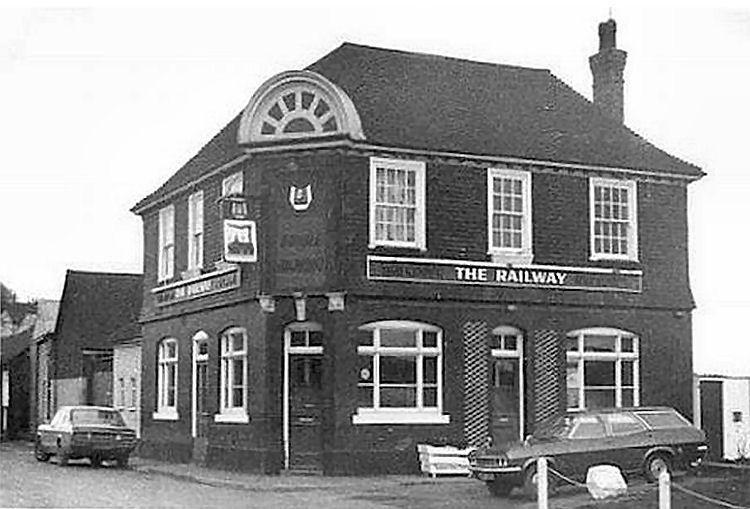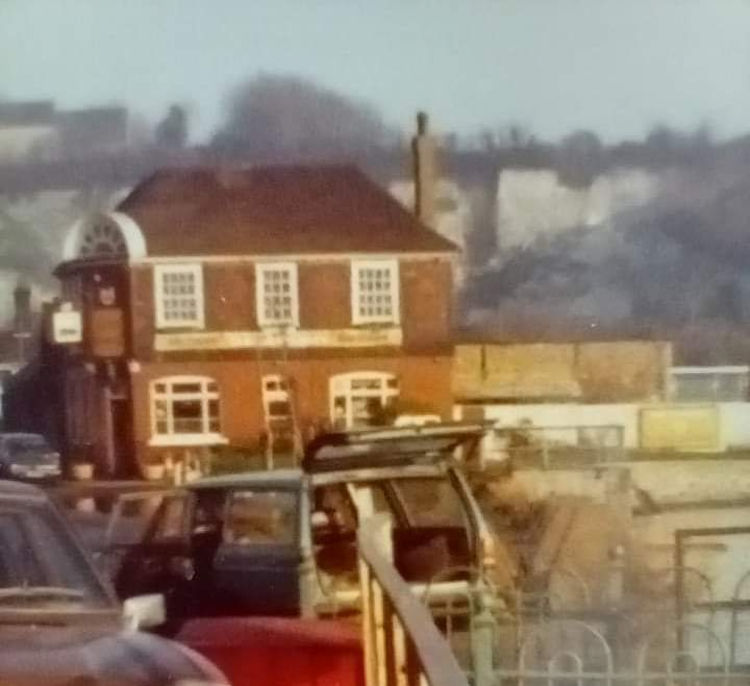|
6 or 8 Canal Road
Strood

Above photo, date unknown. |

Above photo 1982. |
Also referred as the "Railroad Tavern" in the 1851 census, and has also
been addresses as 6 Canal Road, Frindsbury in an 1874 directory and the 1881
census. I am assuming this changed name from the "Canal
and Railway Tavern" some time before that date.
This was mentioned in a book called the "History of Strood" by Henry
Smetham, published 1899, who says it was situated on the south side of the
High Street.
In 1871 ex-Emperor Napoleon III, his Empress Eugenie and the Prince
Imperial waited in the garden of the "Railway Tavern" for a steamboat from
Strood Pier. On their return on the boat news had spread of their presence.
The Mayor and Mayoress and crowds of cheering people greeted them. The
Landlord of the pub re-named it the "Railway Tavern and Imperial Hotel" the
following day. I do not know how long this name lasted for or indeed whether
that story is just an urban myth.
Ind Coope & Co Ltd purchased an unlicensed shop at 13 Canal Road from
Budden & Biggs Brewery Ltd by conveyance and assignment dated 23 March 1931.
Around the 1960s the locals used to refer to this pub as the "Red Brick"
but it never had that name officially.
|
From the Sevenoaks Chronicle, 31 August 1852.
CITY ANNUAL LICENSING DAY.
On Saturday a special petty session was held before a full bench,
consisting of eleven magistrates, for the hearing of applications for
new licenses and for other business of the general annual licensing day.
Mr. Lewis, on behalf of Mr. James Prudhoe, proprietor of the "Railway
Tavern" beer shop, applied for a license for that house, the property of
Sir H. Maux and Co., and situate at the terminus of the North East
Railway at Strood.
Mr. King, solicitor, of Maidstone, opposed the application, and
submitted that the service of the notice had not been consistent with
the statute, inasmuch as the affixing on the church door only took place
on one Sunday and not on three several Sundays as prescribed by the Act.
The Court over-rules the objection, and the case proceeded with.
Mr. Lewis then stated the grounds on which he made the application,
which, although nominally for Mr. Prudhoe, was really on behalf of the
public. The house had been at an outlay of £1,000 and although having
every accommodation, was capable of further improvement.
Mr. King opposed the application on behalf of the owners of the
"Windmall Tavern," belonging to Mrs. and Miss Hulkes, and also the
occupier, Mr. Roffway. Mr. Roffway had occupied the "Windmill Tavern"
for about twenty years, a house containing all the accommodation that
was requisite, and which had been increased by improvement from time to
time. The application had been refused on two previous occasions, and
there were no new grounds, he submitted, for coming to any other
decision.
Mr. Coles said he was anxious to arrive at Mr. Prudhoe's position with
regard to the road. The magistrates had had recently three or four cases
before them, in which some doubt had been expressed as to whether it was
a public road. Certain omnibuses were kept out, which the South Eastern
Company said they had a right to keep out.
Mr. Lewis said there was an ancient public foot-path from Strood Street
to Frindsbury, but he could not say whether the road was a public one.
Mr. Alderman Essel explained that until of late years the public had no
right to the road. The pathway to which the public had a right was formerly on the top of the sea wall, but in order to negative the right
of the public way, a bar was placed along the road. The public had no
right to pass along that road with carriages, and it was not a public
carriage way. He then called Mr. Roffway, who deposed that his house was
within a minute or a minute and a half's walk of the station, and was on
the same side of the way. When the works of the new bridge were begun, a
great number of houses were taken down, by which he was deprived of a
large portion of the trade which formerly belonged to this house.
Mr. Lewis having replied, the magistrates granted the license.
|
|
Southeastern Gazette, 21 June 1853.
STROOD, KENT. TO HOTEL AND TAVERN KEEPERS.
A Lease, Goodwill, and Possession of all that noted and well-known
profitable Tavern, situate and being at the terminus of the
Rochester, Chatham, and London North Kent Railway at Strood.
Mr. J. T. SKINNER is instructed by the freeholders to offer FOR SALE
BY PUBLIC AUCTION, At Garraway’s Coffee-house, Change-alley,
Corn-hill, London, on Thursday, June 30th, 1853, at Twelve o’clock
at noon,
A LEASE, with the goodwill and possession of all that well-known
"RAILWAY TAVERN," now in the tenure or occupation of Mr. James
Prudhoe. The lease will be granted for a term of seven years, from
Mid-summer-day, 1853, at a rental of £100 per annum, with an option
to the purchaser to take a further term or terms so as to make
fourteen or twenty-one years at the same rate and on the same
condition as the lease to to be sold.
The house and grounds are pleasantly situated, and comprise a large
frontage to the river Medway, enclosed by a neat iron and palisade
fence, with lawn, shrubbery, and garden, excellent stable for seven
horses, coach-house, paved stable yard, with convenient offices,
&c., enclosed by a brick wall and folding gates, directly opposite
the railway terminus. The basement floor contains a good and roomy
kitchen, pantry, scullery, four cellars for the store of spirits,
wine, beer, &c. On the ground floor are a convenient and well
arranged bar, and bar parlour, coffee-room, smoking-room, tap-room,
and passage. The upper floor consists of a large commodious
dining-room, sitting-room, two bed-rooms, store closets, &c., and is
now doing a large and profitable business, which may be considerably
increased. The lease will be sold subject to the purchaser taking
Sir H. Meux and Co's draught beer and ales, also to take the
tenant’s goods, fixtures, and effects by valuation of two appraisers
or their umpire, and the stock by guage in the usual way.
The house and premises may be viewed by application and leave of the
tenant. Printed particulars and conditions of sale are preparing,
and may be had, five days before the sale, by applying to Messrs
Colley, Smith, Hunter, and Co., Solicitors, Lincoln’s Inn, London;
the "Railway Tavern" and "Angel Inn," Strood; the "Crown,"
"Bull," and
"Red Lion Inns," Rochester; the "Sun Inn," and of the Auctioneer,
278, High-street, Chatham; and Garraway’s, Corn-hill.
|
|
South Eastern Gazette, 22 November 1853.
Coroners Inquest.
On Friday evening Mr. Prall, deputy coroner, held an inquiry at the
"Railway Tavern," Strood, touching the death of Stephen Kingsnorth,
of Strood, who was found on the previous Wednesday, lying dead in
the mud in the marsh, near the canal.
Thomas Wadhams deposed that between five and six o’clock in the
evening he saw the deceased at the spot where he was subsequently
found, standing in a stooping position. It was moonlight at the
time, and witness knew deceased by his jacket and southwester.
Harriett Goatley stated that she went with the wife of the deceased
to several public-houses to seek for deceased, as he had been absent
since the first of the morning. They afterwards went to the canal,
when the wife found his jacket, and afterwards screaming out, she
said she saw his body lying in the mud. Information was then given
to several parties, and the body was got out.
William Sharp, hearing cries of "Murder," hastened to the spot from
whence the cries came, and there saw some females near Mrs. Culver’s
cottage. Witness afterwards found the body near a sluice not far
from Mr. Winch’s premises. With assistance be got the body out.
Dr. Brown, who had been sent for, said death might have been
caused
by suffocation.
This being the whole of the evidence, the jury returned a verdict
accordingly.
|
|
South Eastern Gazette, 25 September, 1860.
CITY PETTY SESSIONS.
Tuesday. (Before B. B. Coles ad B. Everest. Esqrs.)
William Sharp, who did not appear to the charged with with using
indecent and obscene language at Mr. Barker's "Railway Tavern,"
Canal-road.
The offence having been fully proved, Mr. Coles stated that in
consequence of the accused treating the court with such disrespect,
in not attending to the summons he would be imprisoned for one
month.
|
|
From the Maidstone Telegraph, Rochester and Chatham Gazette, 16 November 1861.
Inquest.
On Wednesday evening last an inquest was held at the "Railway Tavern,"
Strood, before Rower Marsh, Esq., deputy coroner, touching the death of
William Mills, a porter employed at the South Eastern Railway, at Strood,
who was found on Tuesday evening in the canal near the good station.
William Potterton said that he was drinking a pint of ale with deceased
at the "Refreshment Room," Strood, on Tuesday evening last, when he
left, and said he was going home. He was perfectly sober at the time.
Mr. Price, the station master, spoke very highly of deceased as a very
sober attentive man, and much regretted his death.
There being no evidence to show how deceased came into the water, the
jury returned a verdict of "Found Drowned."
|
|
From the Southeastern Gazette, 13 February 1866.
Saturday. (Before the Major, E. R. Coles, F. M.
Webb, J. Thomas, H. Everest, and W. Bell, Esqrs.)
Edward Tilly and William Foster, soldiers, were
charged with the following disgraceful conduct:-
Christopher Williams said he was at the “Railway
Tavern,” Canal-road, when, without having given them the slightest
provocation, the defendants commenced assailing him with the foulest
language, which they followed up by striking him; the prisoner Foster,
who was the most violent, taking off his bolt and using it pretty freely
on the prosecutor, whose head was cut in three places.
The evidence of the prosecutor having been fully
confirmed, the Mayor fined Foster 10g. and costs, and Tally 5s. and
costs; paid.
Alerman Coles said attention had been repeatedly
called to the practice of allowing soldiers to wear their belts when off
duty, and hoped it would be discontinued.
|
|
Sevenoaks Chronicle and Kentish Advertiser 18 November 1949.
MARRIAGE. SIMMONS-HARRISON.
On the 12th November, 1949, at St. Mary's Church,
Strood, by the Rev. Band, Maurice Auther, son of Mr. & Mrs. G. Simmons,
of Orchard Cottage, Capel, to Laura Rosie, daughter of Mr. and Mrs.
Harrison, of "Railway Tavern," Strood.
|
LICENSEE LIST
PRUDHOE James 1851-53+ (age 35 in 1851 ) )
MARTIN Joseph Job 1858+
BARKER Alfred 1860-62+ (age 38 in 1861 ) )
BLAKE Harriett Mrs 1870+
NUTT J T 1874+
ROBERTS James 1881-91 (age 48 in 1891 ) )
WETHERLEY John 1981-03+ (age 38 in 1891 ) )

JOHNSON Stephen 1901+ (age 50 in 1901 )? )?
HILL Ernest Thomas 1913-30+
FILMER W T 1938+
SMITH Robert G 1955+
HARRISON E Mr 1949-53+

https://pubwiki.co.uk/RailwayTavern.shtml
 Sevenoaks Chronicle and Kentish Advertiser Sevenoaks Chronicle and Kentish Advertiser
 From the Kelly's Directory 1903 From the Kelly's Directory 1903
 Census Census
|

